Related Research Articles
The politics of Nepal functions within the framework of a parliamentary republic with a multi-party system. Executive power is exercised by the Prime Minister and their cabinet, while legislative power is vested in the Parliament.

The Nepali Congress is the largest social democratic political party in Nepal. As per the results of recent local election, Nepali Congress stands as the single largest party of Nepal at all levels of government. It is the current ruling party of Nepal since July 2021. With more than one million active members, the party remains the largest party in Nepal by membership.

The Communist Party of Nepal is the second largest political party in Nepal. As per the results of recent elections, CPN (UML) stands as the second largest party of Nepal at all levels of government. There have been four prime ministers from the party while the party has led the government five times. CPN (UML) currently serves as the opposition in the Federal Parliament of Nepal and all of the seven provincial assemblies. As of 2021, the party claims to have nearly 600,000 members.
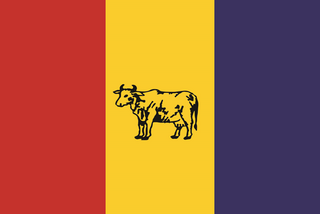
The Rastriya Prajatantra Party is a constitutional monarchist and Hindu nationalist political party in Nepal. It was formed by former Panchayat-era prime ministers Surya Bahadur Thapa and Lokendra Bahadur Chand. The party led the government two separate times in 1997 under Thapa and Chand. The two were also appointed prime minister by King Gyanendra in the 2000s; Chand in 2002 and Thapa in 2003.
There are three types of elections in Nepal: elections to the Federal Parliament, elections to the provincial assemblies and elections to the local government. Within each of these categories there may be by-elections as well as general elections. Currently three electoral systems are used: parallel voting for House of Representatives and provincial assemblies, Single transferable vote for National Assembly and first past the post for local elections.
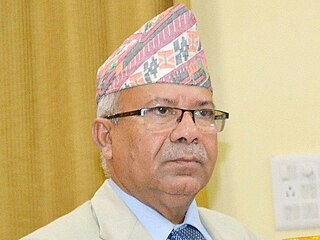
Madhav Kumar Nepal, is a Nepalese politician and former Prime Minister of Nepal. He served as Prime Minister of Nepal from 25 May 2009 to 6 February 2011 for nearly two years.
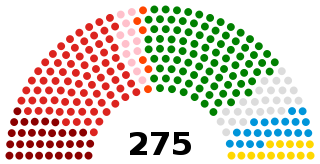
The House of Representatives, or Pratinidhi Sabha is the one of the houses of the Federal Parliament of Nepal, with the other house being the National Assembly. Members of the House of Representatives are elected through a parallel voting system. They hold their seats for five years or until the body is dissolved by the President on the advice of the council of ministers. The house meets in the International Convention Centre in Kathmandu.

The Federal Parliament of Nepal is the bicameral federal and supreme legislature of Nepal established in 2018. It consists of the National Assembly and the House of Representatives as parallel houses.

Upendra Yadav is a Nepalese politician who has served as the chairman of the People's Socialist Party, Nepal since 2020. He served as the Deputy Prime Minister of Nepal under the government of KP Sharma Oli from 2018 to 2020. He also served as the Minister of Foreign Affairs in the Dahal cabinet from 2008 to 2009 and in the Khanal cabinet in 2011.
Hridayesh Tripathi is a Nepalese politician, belonging to the People's Progressive Party. He's also the current chairman of the party.

General elections were held in Nepal in two phases on 26 November and 7 December 2017 to elect the 275 members of the fifth House of Representatives, the lower house of the Federal Parliament of Nepal. The election was held alongside the first provincial elections for the seven provincial assemblies. A political deadlock between the governing Nepali Congress and the winning left-wing coalition over the system used to elect the upper house led to delay in forming the new government. Following the announcement of final result by the Election Commission, K.P. Oli of Communist Party of Nepal was sworn in as Prime Minister on 15 February 2018 by the President according to Article 76 (2) of the constitution. He passed a Motion of Confidence on 11 March 2018 with 208 votes.
The Provincial Assembly is the unicameral legislative assembly for a federal province of Nepal.
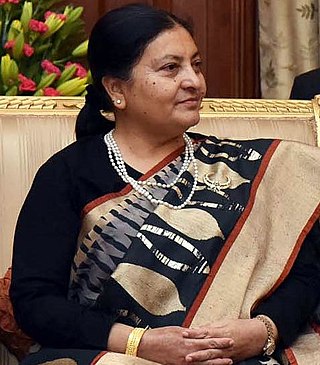
The third presidential election of Nepal was held on 13 March 2018. As a new election law was developed and as, due to the Nepalese election in 2017, an electoral college could be established, the election took place three years after the previous presidential elections despite the presidential term of office actually being set at 5 years. The President was elected by an electoral college composed of the members of federal parliament and provincial assemblies. The total number of voters was thus 880, however the 331 members of Federal Parliament have a vote weight of 79, while the 549 members of Provincial Assemblies have a vote weight of 48. In total 862 lawmakers participated in the election leading to a turnout of 97.95%.
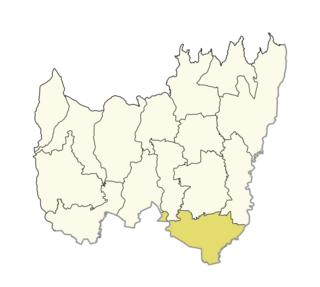
Kachankawal is a rural municipality out of 7 rural municipalities of Jhapa District of Province No. 1 of Nepal. There are total 15 local administrative units in Jhapa District in which 8 are urban and 7 are rural municipalities.
Raghubir Mahaseth is a well-renowned Nepalese politician. Mahaseth is currently serving as the Central Secretary of CPN UML, is the in-charge of the Madhesh Province of Nepal for CPN UML, and is the member of House of Representatives of the federal parliament of Nepal. He previously served as the Deputy Prime Minister and Minister of Foreign Affairs in 2021, Minister for Physical Infrastructure and Transport from 2018 to 2020, and the Minister of Irrigation in 2011.
Mahendra Ray Yadav is a Nepali politician and a member of the House of Representatives of the federal parliament of Nepal. He is the current central committee chairman of Socialist Party of Nepal.
Maheshwar Jung Gahatraj is a Nepali communist politician and a member of the House of Representatives of the federal parliament of Nepal. He was the commander of the first attack carried out by the Maoists, that began the Nepalese civil war.

General elections were held in Nepal on 20 November 2022 to elect the 275 members of the House of Representatives. There were two ballots in the election; one to elect 165 members from single-member constituencies via FPTP, and the other to elect the remaining 110 members from a single nation-wide constituency via party-list proportional representation.

Rajendra Prasad Lingden is a Nepali politician who is the Chairman of the Rastriya Prajatantra Party. He served as a member of the 1st Federal Parliament of Nepal from March 2018 till his resignation in September 2022.
Uma Shankar Aragriya is a Nepalese politician belonging to the People's Socialist Party, Nepal who served as the Minister of Culture, Tourism and Civil Aviation since 4 June 2021 but was removed from the post by Supreme Court on 22 June 2021 making the tenure of just 18 days and shortest till date. He was also a member of the 1st Federal Parliament of Nepal after winning in 2017 Nepalese general election from Dhanusha 2 constituency. Arglariya formerly a popular leader, is thought to join Nepali Congress as his party, Loktantrik Samajwadi Party went clean swept in Dhanusha district in recent local level election.
References
- ↑ संघीय संसद सदस्य, २०७४ परिचयात्मक पुस्तिका [Federal Parliament Members 2017 Introduction Booklet](PDF) (in Nepali). Nepal: Federal Parliament Secretariat. 2021. p. 270.
- ↑ Election Commission of Nepal
- ↑ "Ruling party lawmakers object tweaks to law" . Retrieved 2021-05-15.